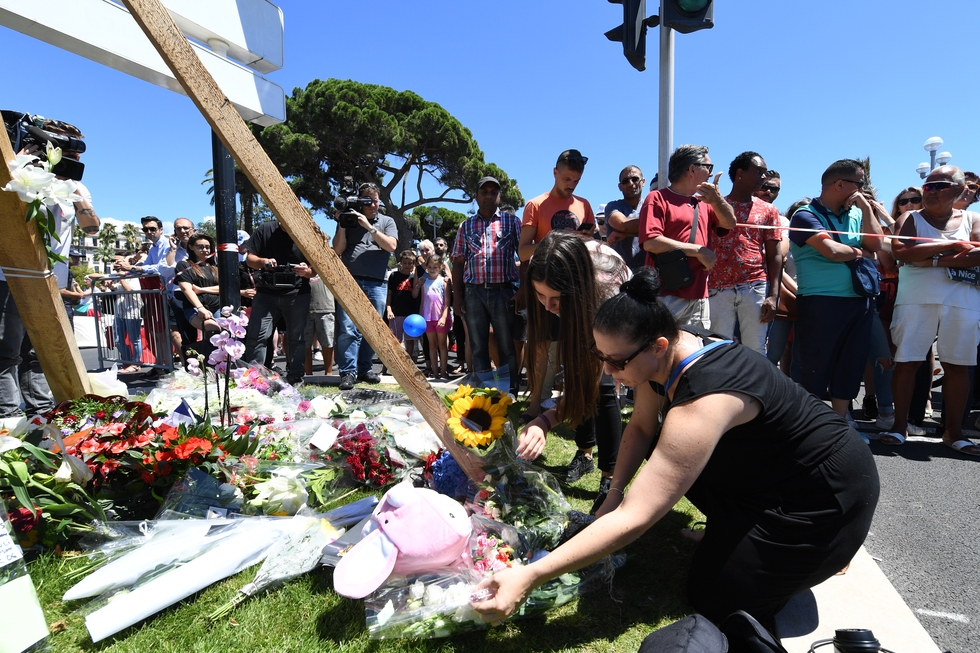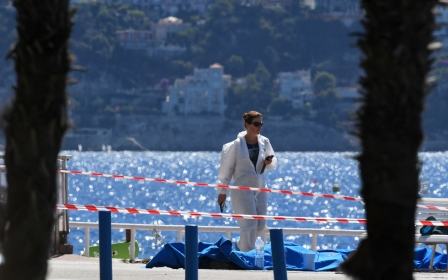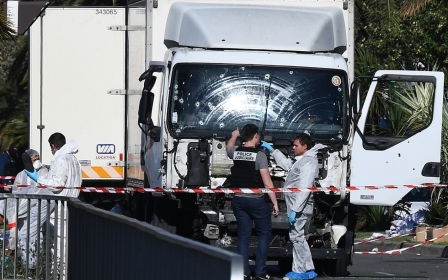Shock, horror and the comfort of strangers after Nice attack

The living held their hands. They knew they were dead, but they would not let them go.
Hours after horror was visited on families who had gathered to watch the Bastille Day fireworks on the seafront in Nice, the dead still lay scattered where they fell across the Promenade des Anglais.
Here and there people sat with them, sometimes alone, sometimes in a little huddles of family and friends.
Some had only the comfort of strangers, after the lorry's murderous passage.
And one victim, a small child who like so many others had been allowed to stay up late to see the fireworks, lay dead on the tarmac with a doll at its side.
"You would think you could do something to help by being there," said Tarubi Wahid Mosta, who tried to do what he could in the aftermath of the attack.
"But we were useless."
The dead remained under sheets as the police investigation began.
"All these families who have already spent a long time at their sides are likely - given the horrible number of the dead - to spent hours on the ground holding the cold hands of bodies dismembered by the truck. You can't even speak to them or comfort them," the actor wrote on his Facebook page.
"That is the hardest thing, to be useless at such a horrible moment."
Lost and found
One photograph he posted shows a headscarfed women kneeling over a body.
"In the middle of all this is a Muslim family (real Muslims), one of whom did not escape this crazy lorry," he said. "Once again everyone has been touched, whether they were believers or not."
Outside a Nice hospital a grieving family later told reporters that their mother, a devout Muslim, had been the first of the lorry's 84 victims.
Long after dawn broke some of the victims were still lying on the promenade covered by blue and white sheets as the first of the morning joggers set out along the Bay of Angels.
Nice is a town that likes to party, that was built to a great extent as a playground for the European aristocracy and industrialists who wintered on the French Riviera in the late 19th century.
Its carnival is the third biggest in the world after Venice and Rio.
Like the carnival, the Bastille Day fireworks display is a huge family occasion, with children allowed to stay up well after their normal bedtimes to enjoy the spectacle.
Several children were among the dead, French President Francois Hollande said. Authorities later confirmed that around 50 were hurt, many seriously.
Such was the violence with which the lorry tore through the crowds that a family was separated from its eight-month-old baby that had been in a pushchair.
He was found by a young woman who brought him home with her and reunited him with his parents after they posted a picture of the boy on Facebook, a family friend told AFP.
After a night of little sleep and many tears, the resort city was still struggling to come to terms with the horror.
No more parties
"I saw a whole heap of dead people in front of me," said a retired man called Charles, who lives close to where the lorry first drove into the crowds.
"There will be no more parties, no more festivals. Yet if we are to face down the terrorists life has to continue," he added.
"This will not stop us living our lives," said Jean, an astronomer who was caught up in the panic with his wife Myriam and his two children and their dog.
He said the dog had led them to safety, to a hotel where the manager told them to go into one of its rooms.
With fears that other gunmen could be on the loose, Myriam told AFP that she locked the children in a shoe cupboard and they remained in the room for three hours before deciding that it was safe to leave.
But the family were back on the promenade on Friday "so the children would not be terrified", Myriam added.
Many of Nice's bars and cafes were closed Friday, as was its lifeguard station on the beach.
One lifeguard, Mehdi Zid, 21, told how he had managed to help "four of five people who where frozen by shock" the night before.
"One lone person is impossible to stop," he said.
Reporing by Francois Becker for the AFP news agency
New MEE newsletter: Jerusalem Dispatch
Sign up to get the latest insights and analysis on Israel-Palestine, alongside Turkey Unpacked and other MEE newsletters
Middle East Eye delivers independent and unrivalled coverage and analysis of the Middle East, North Africa and beyond. To learn more about republishing this content and the associated fees, please fill out this form. More about MEE can be found here.



